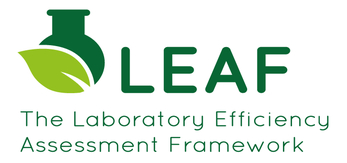The Laboratory Efficiency Assessment Framework 2020 (LEAF) marks the University of Bristol’s move to a greener future. Following on from the University’s ‘climate emergency’ declaration and 2030 carbon neutrality pledge, we’ve set a new ambition for 100% Green Lab Accreditation and institutional LEAF. This will make us the first University in the world to achieve this.
Labs impact the environment, in fact they have a greater environmental impact than offices by at least five times. They use more water and energy, produce larger quantities of waste and generally use more resources. In order to tackle this ever-growing problem LEAF was created with lab users in mind and sustainable thinking at the forefront. LEAF is an innovative tool used to drive sustainability and efficiency within STEMed labs.
In 2019 the LEAF national pilot took place involving 16 national Higher Education Institutions, including the University of Bristol. To gain LEAF accreditation each participating lab must meet a set of criteria to achieve Bronze, Silver or Gold accreditation. Through LEAF, each lab’s carbon and financial savings can be recorded as they progress.
The LEAF criteria cover all environmental aspects of the lab including circular economy and waste, procurement, business travel, equipment efficiency and chemical management. In addition to this, the criteria also include research quality, addressing international issues regarding the ‘reproducibility crisis’. LEAF differs from the previous Green Labs Initiative as it includes metrics that enable us to quantify tangible environmental and financial savings so that we can measure real time changes in line with the University’s 2030 carbon neutrality goals.
Research councils and funding bodies are also collaborating with the Higher Education Institutions taking part in LEAF with an aim for inclusion in relevant research grant proposals within two to three years.
The LEAF accreditation is designed for academic groups or facilities rather than whole departments and involves the technical community, students and research staff.
Benefits of taking part in LEAF
- Reduces utility costs and our environmental footprint
- Provides the opportunity for direct savings through our financial incentive schemes
- Ensures health and safety compliance within labs
- Increases research efficiency
- Provides recognition for individual labs and the University on a national stage
- Enables a bottom-up sustainability movement
- Aligns with our commitment to the Global Sustainable Development Goals (SDGs)
- Integrates different labs and departments
- Strengthens relationships between Estates, lab users and other stakeholders
- Aligns your research with the University strategy and Bristol Futures
- Provides chances of gaining additional research funding
- A selling point for prospective students
- Inter-lab and inter-departmental benchmarking
- Provides practice-based learning experiences that improve professional skills and employability
- Improves student experience via volunteering opportunities as Laboratory Efficiency Assessment Volunteers (LEAVs)
- Creates a better understanding within our community of our science buildings and operations
How LEAF works
After signing-up to LEAF, participants are sent the LEAF Framework – an electronic workbook with a set of easy-to-implement actions. For each accreditation (Bronze, Silver and Gold), participants need to fulfil certain criteria. The workbook provides useful links to help achieve the criteria and information on why these actions are important for improving lab sustainability.
Completing Bronze accreditation should only take an average of five hours, as most of our labs will already be running to Bronze standards. As you progress through Silver and Gold, criteria become more challenging and include categories such as minimising the amount of single-use plastic your lab uses.
There are also several special awards: Environmental Improvement, Environmental Hero, Innovation for Engagement and Community Action.
Throughout LEAF, participants are supported by the Green Labs Team and student LEAF volunteers (LEAVs), who have received environmental audit training. On submission of workbooks, laboratory audits can be organised, led by LEAVs. LEAF aims to improve student experience by providing volunteering opportunities and training. Alternatively, teams can also be audited by staff from Campus Division, or by peer assessment if they wish. On successful completion of the workbook and audit, labs will receive green accreditation status.
LEAF closes 13 November 2020, but teams can submit workbooks and complete audits at any point during the year, note workbooks can be submitted multiple times.
So, if you’re a Technician or academic and aren’t already actively involved in LEAF 2020, sign up now! If you’re a student and you’d like to volunteer with LEAF then sign up here.
This is an exciting time for Sustainability and especially for our University, being the first institution in the UK to declare a climate emergency and the first in the world to aim for 100% LEAF accreditation in all STEMed labs!
——————————————
This blog is written by Rachael Ward and Anna Lewis from the University of Bristol’s Sustainability Team.





